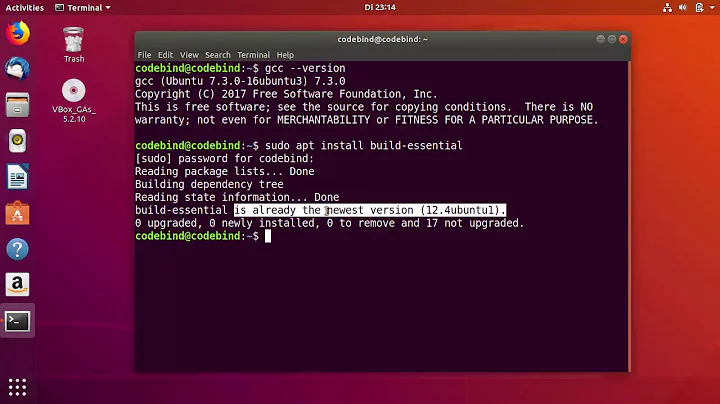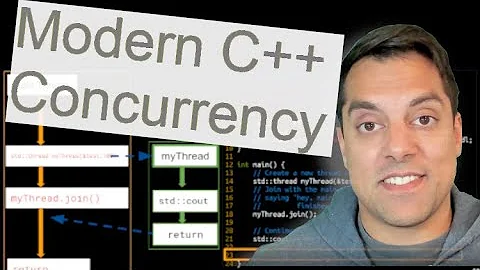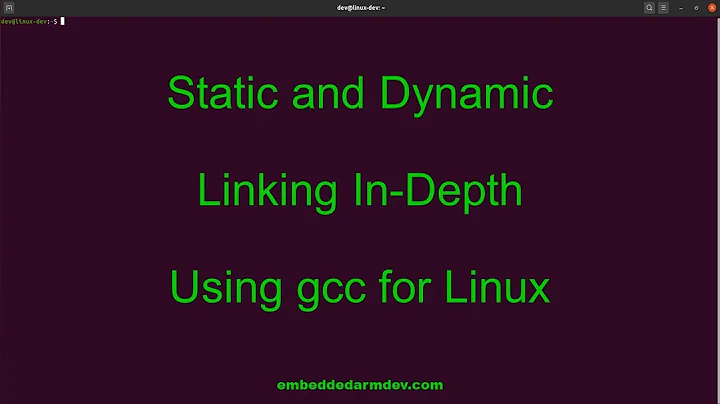Can Clang compile code with GCC compiled .a libs?
Solution 1
Yes, you usually can use clang with GCC compiled libraries (and vice versa, use gcc with CLANG compiled libraries), because in fact it is not compilation but linking which is relevant. You might be unlucky and get unpleasant suprises.
You could in principle have some dependencies on the version of libstdc++ used to link the relevant libraries (if they are coded in C++). Actually, that usually does not matter much.
In C++, name mangling might in theory be an issue (there might be some corner cases, even incompatibilities between two different versions of g++). Again, in practice it is usually not an issue.
So usually you can mix CLANG (even different but close versions of it) with GCC but you may have unpleasant surprises. What should be expected from any C++ compiler (be it CLANG or GCC) is just to be able to compile and link an entire software (and all libraries) together using the same compiler and version (and that includes the same C++ standard library implementation). This is why upgrading a compiler in a distribution is a lot of work: the distribution makers have to ensure that all the packages compile well (and they do get surprises!).
Beware that the version of libstdc++ does matter. Both Clang & GCC communities work hard to make its ABI compatible for compiler upgrades, but there are subtle corner cases. Read the documentation of your particular and specific C++ standard library implementation. These corner cases could explain mysterious crashes when using a good C++ library binary (compiled with GCC 5) in your code compiled with GCC 8. The bug is not in the library, but the ABI evolved incompatibly.
Solution 2
At least for Crypto++ library this does not work (verified :-( ). So for c++ code it is less likely to work, while pure c code would probably link OK.
EDIT: The problem started appearing with Mac OS X 10.9 Mavericks and Xcode-5, which switched the default C++ library for clang from libstdc++ to libc++. It did not exist on Mac OS X 10.8 and earlier.
The solution appears to be: if you need to compile C++ code with clang, and link it to a gcc-compiled library, use "clang++ -stdlib=libstdc++". The linking is successful, and the resulting binary runs correctly.
CAVEAT: It does not seem to work the other way: even though you can build a library compiled with "clang++ -stdlib=libstdc++" and link gcc-compiled code with it, this code will crash with SEGV. So far I found the only way to link with a clang-compiled library is compiling your code with clang, not gcc.
Solution 3
I do have an additional data point to contribute, on the topic of "unpleasant surprises" mixing code from different versions of different compilers. Therein, I link Victor Shoup's C++-based NTL number theory library with a small piece of driver code that just prints out a large factorial computed by the NTL code, a number with a decimal representation that might span multiple lines if sufficiently large.
I have built and installed SageMath (and its version of NTL) on my system running OS X 10.11.6, and also have a current installation of MacPorts. In /usr/bin I find for gcc --version
Apple LLVM version 8.0.0 (clang-800.0.42.1)
Target: x86_64-apple-darwin15.6.0
My MacPorts gcc gives
gcc (MacPorts gcc9 9.1.0_2) 9.1.0
Now, the SageMath build system requires that MacPorts be moved out of the way, so I assume SageMath builds NTL using Apple's development toolset. The SageMath build log is full of invocations of gcc. SageMath actually builds gcc from source if the system on which the makefile is run has too old a version of Apple's developer tools.
My driver code computes big factorials and uses methods of the NTL class ZZ; I initially had tested this by linking to an NTL static library I built myself, and I changed it to link to the SageMath version because I find it pleasing not to duplicate libraries. Now I understand a bit more about the pitfalls which may arise in this process.
The old makefile invoked g++ to make the executable, but this failed at linking phase with the message:
Undefined symbols for architecture x86_64:
"NTL::operator<<(std::basic_ostream<char, std::char_traits<char> >&, NTL::ZZ const&)",
referenced from:
prn_factorial(int, NTL::ZZ&) in print.o
ld: symbol(s) not found for architecture x86_64
collect2: error: ld returned 1 exit status
I had to think about this and run experiments for about 15 minutes before deciding on my own to change the makefile to invoke clang++ which in my current path invokes the MacPorts version
clang version 7.0.1 (tags/RELEASE_701/final)
Target: x86_64-apple-darwin15.6.0
Thread model: posix
InstalledDir: /opt/local/libexec/llvm-7.0/bin
This time, the makefile successfully linked and built my executable. I conclude that this represents one of those edge cases with "unpleasant surprises". Probably I should conclude that working with details of C++ is not for me; big software systems like SageMath are developed just so hobbyists don't really have to muck around with details like these.
Related videos on Youtube
DuckQueen
Updated on June 03, 2022Comments
-
DuckQueen almost 2 years
I have my project currently compiling under gcc. It uses Boost, ZeroMQ as static
.alibraries and some.solibraries like SDL. I want to go clang all the way but not right now. I wonder if it is possible to compile code that uses.aand.solibraries that were compiled under gcc with clang? -
 Brian Cannard almost 10 yearsWithout mentioning a kind of unpleasant surprises you look like an Apple employee.
Brian Cannard almost 10 yearsWithout mentioning a kind of unpleasant surprises you look like an Apple employee. -
 Brian Cannard almost 10 yearsActually, libvpx can be compiled with gcc and then linked with standard LLVM compiled Objective-C app. The thing you only need - is static link with their libstdc++/libc++. It is not a noncense - while you don't interchange malloc'ed data it will work fine! But who nowadays interchanges dynamic data between libraries? :-)
Brian Cannard almost 10 yearsActually, libvpx can be compiled with gcc and then linked with standard LLVM compiled Objective-C app. The thing you only need - is static link with their libstdc++/libc++. It is not a noncense - while you don't interchange malloc'ed data it will work fine! But who nowadays interchanges dynamic data between libraries? :-) -
 Basile Starynkevitch almost 10 yearsI am not and was never an Apple employee. You can find details about me on starynkevitch.net/Basile; I contribute to GCC (and work on MELT ...)
Basile Starynkevitch almost 10 yearsI am not and was never an Apple employee. You can find details about me on starynkevitch.net/Basile; I contribute to GCC (and work on MELT ...)








